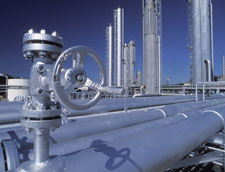Viscosity is one of the most important measures of refinery product quality. All refinery products are graded by viscosity.
Significant efforts are spent throughout refinery operations in achieving viscosity targets. Working with customers worldwide, Cambridge Viscosity has identified five factors most important for efficient and effective refinery viscosity management.
1) Get it Right the First Time
 It is a lot cheaper to build quality in at the start, rather than adjust for it later. Achieving viscosity targets the first time saves refineries time and money by minimizing inventory and post-process blending, while improving throughput. The best refiners combine laboratory analysis with in-line viscometers to consistently produce to targets.
It is a lot cheaper to build quality in at the start, rather than adjust for it later. Achieving viscosity targets the first time saves refineries time and money by minimizing inventory and post-process blending, while improving throughput. The best refiners combine laboratory analysis with in-line viscometers to consistently produce to targets.
2) Handle Lab Samples Correctly
Refinery lab results are impacted by the test methods used and the quality of the sample being analyzed. To help ensure the quality of the sample for accurate results: 1) Take the sample in a way that it is representative of the product being produced; 2) Keep the sample clean and covered to minimize contamination and the loss of volatiles throughout sample taking and transport, and during laboratory analysis.
3) Use Dependable In-line Viscometers for Continuous Control
In-process viscometers must be accurate, robust and reliable for refinery operations. The viscometer must be able to function properly despite changes in flow, process vibrations, fluid non-homogeneity, particles and temperature changes. And to avoid creating additional issues, it is important to use viscometers that are easy to install and require little maintenance or re-calibration.
4) Achieve Lab Quality Measurements In-Line
Conditioning the in-line sample stream is essential for continuous, accurate results while minimizing maintenance. The three most important conditioning factors are: 1) Maintaining known and stable temperature control; 2) Particle filtering, and; 3) Flow control.
5) Validate In-line with Lab Measurement Throughout Process
Refining raw materials and processes are variable. Combining periodic lab analysis with continuous process control gives refiners the best command and control system for consistently producing quality products. The associated revenue and cost savings pass directly to the refiner’s bottom line.
Cambridge Viscosity’s viscometers are well-suited to meet refiner’s needs. Cambridge lab and process viscometers use the same core technology and are fully compliant with ASTM D7483. Cambridge viscometers are compact, require small amounts of sample, incorporate temperature sensors and are extremely accurate, repeatable and robust. They incorporate the lessons learned and are fully refinery-proven from crude through diesel, with asphalt and lubricant processes in-between.
Learn more by clicking below to download our Ashpalt Viscosity Control whitepaper!
About Cambridge Viscosity
Cambridge Viscosity, the leader in small sample viscosity systems, provides automated viscometers used by oil companies in exploration, refining and products worldwide; as well as in, coating, chemical and life science companies to optimize product and process performance. Cambridge's global reach provides application engineering support and service wherever and whenever needed.





